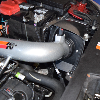I'm trying to bring life back into my '96 Explorer. I'm working on the brakes today. I just blead the brakes and put new fluid in the master cylinder. So there is new fluid and no air in the line. I took it for a test drive around the block. I stomped the brakes and they grab hard at first then they release to come to a nice easy stop. I was expecting a hard stop all the may to the finish, but it putters out at the end. It stops fine when doing an easy stop at a stop sign or something, but if fails for an emergency stop.
Any suggestions?
Welcome Dave, and what brake pads are you using? I prefer the Ford severe duty pads, which cost around $50 for the fronts, they have built in friction plates on the back, and are dark blue in color.
The ABS should operate when you hit the brakes hard.
If the pads are fresh, new, do not mash the brake pedal. Fresh pads need a break in period, to bed in the material, without smoking them immediately after installing. The vehicle should be driven without using the brakes hard, for a enough time that the brakes are used mildly, for say 50 stopping events. When you do it enough with light braking, after that you then use the brakes hard, briefly, for a stop of say 30mph-0, but not 75-0. Let the brakes cool down between stops, not 10 seconds, but five minutes of light use. Then do it again. Eventually you decide the pads have had enough bedding in, and then you mash the brakes from 60mph down to zero.
At some point, the pads will smell, you should notice it(have the window down). If you notice it when the brakes are nearly new, still fresh, then you didn't spend enough time bedding the pads in. That can and often leads to shortened pad life, or squealing.










